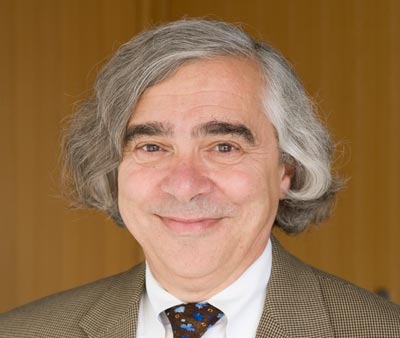Posts by: Michael Banks
Read all about it
By Michael Banks
 The 71-year-old theoretical physicist Paul Frampton, who was arrested in Argentina in 2012 with 2 kg of cocaine in his luggage, has released his own version of events.
The 71-year-old theoretical physicist Paul Frampton, who was arrested in Argentina in 2012 with 2 kg of cocaine in his luggage, has released his own version of events.
The British-born physicist was in Argentina after thinking he had struck up a correspondence on the Internet with Czech-born lingerie model Denise Milani.
However, when he arrived, Milani was nowhere to be seen and Frampton was apparently asked by someone else to carry a suitcase for her, which turned out to contain the drugs.
Despite protesting his innocence, Frampton was sentenced in November 2012 to 56 months in jail in Buenos Aires, some of which he spent under house arrest.
Now, in a 45-page e-book – Tricked!: the Story of an Internet Scam – Frampton outlines “the true story of an adventure that I would rather not have had”. According to the book’s blurb, it provides an “important lesson” that is “essential reading for everybody who uses the Internet”.
It could be the best £3.83 you ever spend.
View all posts by this author | View this author's profile
UK to open its first ‘pub observatory’
By Michael Banks
Fancy having a few pints while gazing at the stars? Well soon you will be able to, thanks to a new initiative at the Barge Inn at Honeystreet on the banks of the Kennet and Avon canal in Wiltshire, UK.
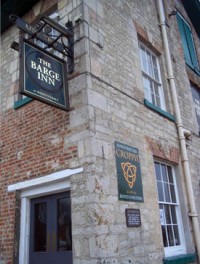
The Barge Inn. (Courtesy: The Barge Inn)
Known as “the most famous pub in the universe”, the boozer is already a favourite among UFO aficionados and crop-circle hunters.
But now the free house, which has its own brewery making beers such as Alien Abduction and Roswell, is turning to the stars by creating the UK’s first pub observatory.
The 205-year-old rural pub recently had planning permission accepted by Wiltshire county council for a 6 m-tall domed observatory to be constructed in the pub’s neighbouring campsite.
Dubbed the Honeystreet Observatory, it will be able to accommodate groups of about twenty people and will feature a Celestron 14″ 1400 Pro telescope. The images from the telescope will also be relayed onto screens in the pub.
It is hoped that the observatory will boost visitors, particularly in the winter months when there is less daylight and more time for observations – and drinking, of course.
“We had originally intended to build the observatory next year but due to the great
response since gaining planning consent, construction will commence next
month.” pub landlord Ian McIvor told physicsworld.com.
And will it be a good idea to mix alcohol with astronomy, particularly with the tricky ascent to the telescope? “You would be amazed at what some of the pub’s customers can accomplish after a few pints,” adds McIvor. “Gazing at the stars and falling down the stairs is a regular activity, so we think it will be business as usual!”
View all posts by this author | View this author's profile
Debating UK science

Science and the ballot box. (Courtesy: iStockphoto/stocksnshares)
By Michael Banks
Yesterday evening I went to the Royal Society in London to hear what the three main political parties in the UK have to say about science. The event was held because in May voters in the UK will be heading to the polls to choose their next government. The three parties had therefore sent their main science representatives to the Royal Society to spell out their intentions.
Chairing the debate was space scientist Maggie Aderin-Pocock of University College, London. She had the unenviable task of keeping science minister Greg Clarke (Conservative), Liberal Democrat science spokesperson Julian Huppert, and shadow universities, science and skills minister Liam Byrne (Labour) in check. For non-UK readers, it’s worth pointing out that the Conservatives have been in coalition with the Liberal Democrats since 2010.
View all posts by this author | View this author's profile
Milestone for preprint server
By Michael Banks
The arXiv preprint server received its millionth paper on 25 December 2014 – a major milestone for the repository, which was set up by the physicist Paul Ginsparg in 1991.
Cornell University’s arXiv has its roots in xxx.lanl.gov – a server set up by Ginsparg, who at the time was at the Los Alamos National Laboratory to share preprints in high-energy physics. It was originally intended for about 100 submissions per year, but rapidly grew in users and scope, receiving 400 submissions in its first half year.
View all posts by this author | View this author's profile
The 10 quirkiest physics stories of 2014
By Michael Banks
From a particle collider made of LEGO to physicists taking on the ice-bucket challenge, physics has had its fair share of interesting stories this year. Here is our pick of the 10 best, in chronological order.
The designated survivor
The nuclear physicist and US energy secretary Ernest Moniz may be 14th in the US presidential line of succession, but if something really terrible had happened in late January, then he might have found himself leading the world’s biggest economy. That is because Moniz was appointed the “designated survivor” while US president Barack Obama delivered his State of the Union address earlier this year.
The speech, which is attended by the country’s top leaders, including the vice-president, members of the US cabinet and Supreme Court justices, is where US presidents outline their legislative agenda for the coming year. A designated survivor is a member of the cabinet who stays at a distant, secure and undisclosed location during the address to maintain continuity of government in the event of a natural disaster or terrorist attack that ends up killing officials in the presidential line of succession.
View all posts by this author | View this author's profile
Physics World Special Report: India
By Michael Banks
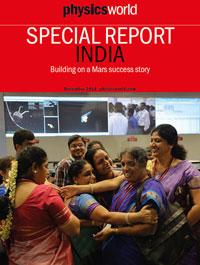
This year has been one of change for India. In May, some 800 million eligible voters went to the polls in an election that was won by the Bhartiya Janata Party. Led by Narendra Modi, the party went on to form a coalition government called the National Democratic Alliance.
Our Special Report, which you can read free online, kicks off by looking at how science is faring under Modi’s fledgling administration. Indeed, in September, Modi was personally on hand at the Indian Space Research Organisation (ISRO) to laud engineers who had just carefully manoeuvred the Mars Orbiter Mission into position around the red planet – a feat that announced India as a major player in space exploration.
Modi’s personal interest in ISRO will not only please the organization’s chairman K Radhakrishnan, who we interview for the report, but could also be seen as a sign that the new administration is serious about boosting science in the country.
View all posts by this author | View this author's profile
Build your own LEGO particle collider
By Michael Banks
You may remember last year when particle physicist Sascha Mehlhase of the Niels Bohr Institute in Copenhagen unveiled a 560-piece LEGO model of CERN’s ATLAS detector at the Large Hadron Collider.
Well, not to be outdone, LEGO fan Jason Allemann has now created a LEGO-inspired particle accelerator. Dubbed the LEGO Brick Collider (LBC), the design has been submitted to LEGO’s CUUSOO site, which lets fans share blueprints of their own models.
View all posts by this author | View this author's profile
Physics World 2014 Focus on Big Science is out now
By Michael Banks
This year has been a special one for the CERN particle-physics lab near Geneva as it turns 60 years old. It was back in 1954 when the CERN convention was ratified by its first 12 member states and the European Organization for Nuclear Research was officially established.
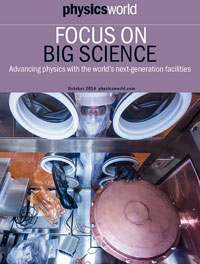 The past few months have seen CERN celebrate in style with a whole host of symposia, meetings, plays, films, concerts and other events being held at the lab and at member states across Europe.
The past few months have seen CERN celebrate in style with a whole host of symposia, meetings, plays, films, concerts and other events being held at the lab and at member states across Europe.
Indeed, researchers at CERN have had a lot to celebrate recently, following the discovery of the Higgs boson at the lab in 2012, and they will be hoping for yet more success when the Large Hadron Collider (LHC) switches on next year following a two-year upgrade and maintenance programme.
In the latest Physics World focus issue on “big science” we look at what has been going on at CERN during the shutdown as the lab gears up to hunt new particles beyond the Higgs boson. Once back online, the LHC will be generating even more data than in its previous run and this focus issue also investigates how researchers are going to deal with the huge volumes of information that will be generated at many upcoming facilities, as well the need to train the next generation of researchers to use them.
View all posts by this author | View this author's profile
Pushing the frontiers of precision
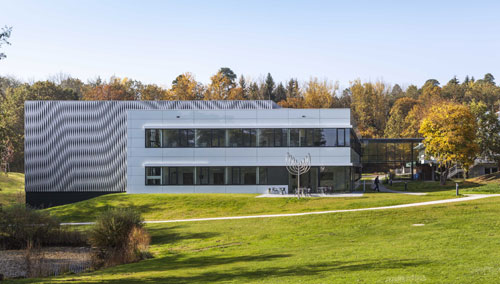
The €25m Precision Laboratory at the Max Planck Institute for Solid State Research in Stuttgart, Germany. (Courtesy: MPI-FKF)
By Michael Banks in Stuttgart, Germany
“There is nothing like this in Germany,” states Klaus Kern, a director of the Max Planck Institute (MPI) for Solid State Research in Stuttgart, Germany, as we walk around the institute’s Precision Laboratory, which opened in 2012 at a cost of €25m.
Kern took me on a guided tour of the the centre, which he has been involved with since its conception in 2008, during a break from attending a symposium celebrating the life of Manuel Cardona, a former institute director who passed away earlier this year.
The building is unique, not only in Germany but worldwide, as it offers researchers a space in which to do experiments that are seismically, acoustically and electrically isolated from the environment.
Physicists take on the ice bucket challenge
By Michael Banks
The ice bucket challenge, which involves people pouring a bucket of ice-cold water over their heads, has taken the social media world by storm raising millions of pounds for motor neurone disease and other charities.
Not wanting to miss out, researchers have also got involved in the act. One of those to take part is the Cambridge physicist Stephen Hawking, who has suffered with the disease since he was 21. He stepped up to the challenge – albeit with a twist. In a video filmed outside his family home in Cambridge, UK, Hawking says that as he suffered from a bout of pneumonia last year it would “not be wise” to have a bucket of ice-cold water poured over him. So instead he passed over the challenge to his children – Robert, Lucy and Tim – who were then doused with three buckets of icy water, while Hawking watched on.
View all posts by this author | View this author's profile

